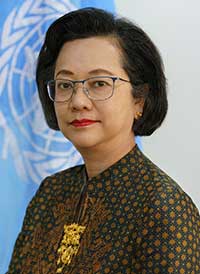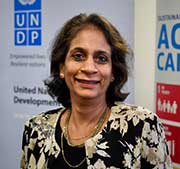Achieving the SDGs in Extraordinary Times — Global Issues
BANGKOK, Thailand, Jul 15 (IPS) – The start of the “Decade of Action” to achieve the United Nations’ Sustainable Development Goals (SDGs) has also marked the start of an unprecedented period of overlapping crises.
The Covid-19 pandemic and crises of conflict, hunger, climate change and environmental degradation are mutually compounding, pushing millions into acute poverty, health, and food insecurity. The Russian invasion of Ukraine has further disrupted supply chains and brought spikes in food and fuel prices.

The devastation caused by efforts to control the spread of Covid-19 across the Asia-Pacific region is now well documented. At least 90 million people have likely fallen into extreme poverty, and more than 150 million and 170 million people are under the poverty lines of US$3.20 and $5.50 a day, respectively.
The pandemic drove home the consequences of uneven progress on the SDGs and exposed glaring gaps in social protection and health-care systems. The dynamics of recovery in Asia and the Pacific have been shaped by access to vaccination and diagnostics, as well as by the structure and efficacy of national economies and public health systems.
Yet for all the economic contraction, greenhouse gas emissions in the Asia-Pacific region continued largely unabated, and the long-burning climate crisis continues to rage.
The positive effects of producing less waste and air pollution, for example, have been short-lived. Action lags, even as many countries in Asia and the Pacific have committed to scale up the ambition of their climate action and pursue a just energy transition. The political and economic drive to move away from fossil fuels remains weak, even with soaring prices of oil and gas across the region.
As the Ukraine conflict drives greater uncertainty and exacerbates food and fuel shortages, leading to surging prices, security is increasingly at the center of economic and political priorities.
This confluence of issues is adding to the shocks already dealt with by the pandemic and triggering crises of governance in some parts of our region. Again, the poorest and most vulnerable groups are the most affected.

It has never been more important to ensure that the integrated aspects of economic, social, and environmental sustainability are built into our approaches to recovery.
As our joint ESCAP-ADB-UNDP 2022 report on Building Forward Together for the SDGs highlighted, despite important pockets of good practice, countries of Asia and the Pacific need to act much more decisively – and faster and at scale – on this imperative. This redefines what progress means and how it is measured, as development that promotes the well-being of the whole – people and planet.
Extraordinary agenda for extraordinary times
All this is a sobering backdrop for achieving the ambitious agenda of the SDGs. But these interlocking shocks are also a result of a failure to advance on the SDGs as an integrated agenda.
We need unconventional responses and investments that fundamentally change what determines sustainable development outcomes. Rather than treating our current looming crises of energy, food and human security as distinct, we must address their interlinkages.
To illustrate, a determined focus on fiscal reforms that deliver environmental and social benefits can generate big wins. Asia and the Pacific can lead with action on long-standing commitments to eliminate costly environmentally harmful subsidies, including for fossil fuels.

There are also opportunities to repurpose the estimated US$540 billion spent each year on global agricultural subsidies to promote more inclusive agriculture, and healthier and more sustainable systems of food production.
Better targeting smallholder farmers and rewarding good practices such as promoting shifts to regenerative agriculture can help transform food systems, restore ecosystems, and protect biodiversity.
Just transitions
For our part, as UN agencies and multilateral organizations, we are committed to supporting countries to pursue just transitions to rapid decarbonization and climate resilience. Scaling up the deployment of greener renewables will be key to meeting energy security needs.
Similarly, the current food crisis must be a catalyst for an urgent transition to more sustainable, locally secure food production and markets. Agricultural practices that foster local resilience, adopt nature-based solutions while increasing efficiencies, and support climate mitigation practices can strengthen long-term food security.
The SDGs test resolves and require us to address the difficult trade-offs of recovery. To emerge from interlinked crises of energy, food and fiscal space, we must accelerate the transformations needed to end poverty and protect the planet.
We must ensure that by 2030 all people, not just a few, enjoy a greater level of peace and prosperity.
The UN Economic and Social Commission for Asia and the Pacific (ESCAP), the Asian Development Bank and the UN Development Program will host a side event at the High-Level Political Forum for Sustainable Development on July 12, 2022, that will explore these themes further.
Armida Alisjahbana is Under-Secretary-General of the United Nations and Executive Secretary of the UN Economic and Social Commission for Asia and the Pacific (ESCAP).
Kanni Wignaraja is Assistant Administrator of the United Nations Development Program (UNDP).
Woochong Um is Managing Director General of the Asian Development Bank (ADB).
IPS UN Bureau
Follow @IPSNewsUNBureau
Follow IPS News UN Bureau on Instagram
© Inter Press Service (2022) — All Rights ReservedOriginal source: Inter Press Service
Check out our Latest News and Follow us at Facebook
Original Source
